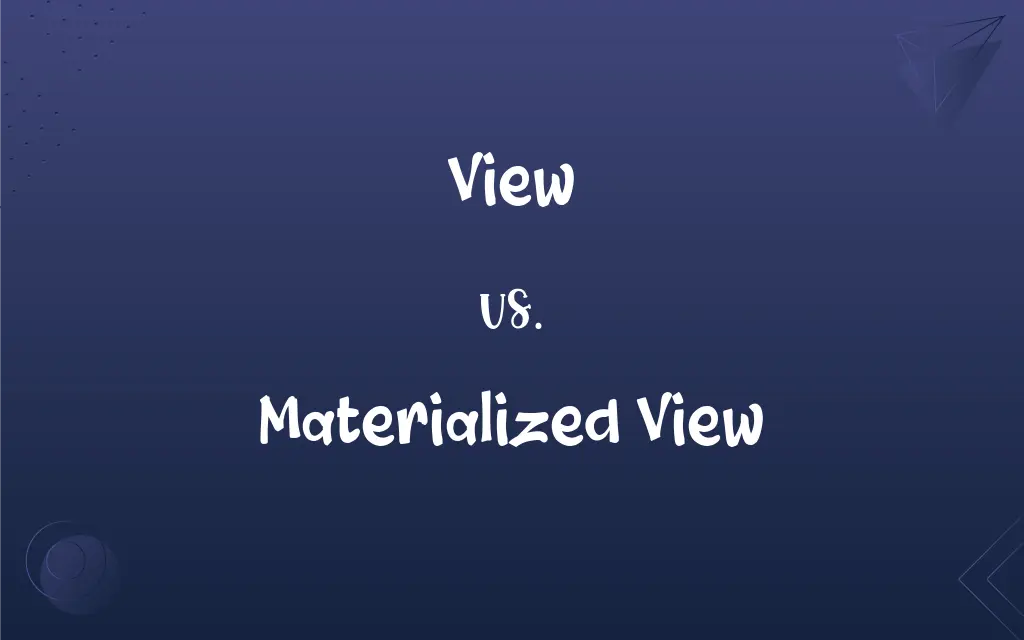View vs. Materialized View: What's the Difference?
Edited by Aimie Carlson || By Janet White || Published on February 20, 2024
A view in databases is a virtual table based on a SQL query, while a materialized view stores the query result physically for faster access.

Key Differences
A view in database systems is essentially a virtual table represented by a SQL query. It does not store data physically; instead, it provides a way to view data from one or more tables dynamically. Materialized views, conversely, are physical copies of data retrieved by a query, stored like a table, and can be updated periodically.
When a view is queried, the database executes the underlying SQL query on the actual data tables to retrieve current data. In contrast, a materialized view holds the result of its SQL query as a concrete dataset, meaning it may not always reflect real-time data changes in the underlying tables.
Views are useful for simplifying complex queries, encapsulating the logic of data transformation, and providing a level of abstraction and security. Materialized views are beneficial for improving query performance, especially in cases where the underlying data doesn't change frequently.
Updating a view doesn't require any additional steps since it's just a query on existing tables. Updating a materialized view, however, involves refreshing the data, which can be resource-intensive depending on the size and complexity of the data.
Views are generally used in scenarios where real-time data is crucial, and the overhead of querying multiple tables is acceptable. Materialized views are preferred in situations where query performance is a priority and slightly stale data is acceptable.
ADVERTISEMENT
Comparison Chart
Physical Data Storage
Does not store data physically
Stores query results physically
Data Freshness
Always up-to-date with underlying tables
Can be outdated, requires refreshing
Query Performance
Depends on underlying query and tables
Generally faster, as data is pre-computed
Use Cases
Real-time data viewing, complex query simplification
Performance optimization, frequent query reuse
Update Method
Automatically updated with base tables
Requires manual or scheduled refresh
ADVERTISEMENT
View and Materialized View Definitions
View
Provides real-time data from the underlying tables.
The sales report view always shows the latest transaction data.
Materialized View
A physical copy of query result stored like a table.
The materialized view for monthly sales aggregates data for faster reporting.
View
Useful for simplifying complex SQL queries.
A view simplifies accessing aggregate sales data across regions.
Materialized View
Improves performance for complex queries.
Using a materialized view significantly speeds up the analytics query.
View
Automatically updates with changes in base tables.
The employee view reflects changes immediately when the base table is updated.
Materialized View
Beneficial where query execution time is critical.
Materialized views are used in dashboards for instant data retrieval.
View
A virtual table in a database defined by a SQL query.
The customer view consolidates data from several tables for easy access.
Materialized View
Requires manual or scheduled updating.
The materialized view of stock inventory is updated every hour.
View
Does not physically store data.
Creating a view doesn't consume extra storage space.
Materialized View
Can become outdated, requiring refresh.
The materialized view is refreshed nightly to update the data.
View
An examination using the eyes; a look
Used binoculars to get a better view.
View
Field of vision
The aircraft has disappeared from view.
FAQs
What's the advantage of a materialized view?
It improves query performance for complex or frequent queries.
Do views store data?
No, they don’t store data physically.
When should you use a view?
For real-time data access and simplifying complex queries.
Are materialized views automatically updated?
No, they require manual or scheduled refreshing.
What is a database view?
A virtual table in a database defined by a SQL query.
How do views provide data security?
By restricting access to specific data through selective query definitions.
Can a materialized view be indexed?
Yes, for even faster query performance.
What is a materialized view?
A physical storage of query results, functioning like a table.
How often should a materialized view be refreshed?
Depending on the need for data freshness and system resources.
Can views be updated?
They automatically update as the underlying data changes.
Does refreshing a materialized view impact performance?
Yes, particularly if the underlying query is complex or data volume is large.
Can views impact database performance?
Yes, especially if based on complex or inefficient queries.
Why use a materialized view instead of a view?
For faster query results, especially in data-intensive operations.
Do materialized views improve report generation?
Yes, by providing quicker access to pre-computed data.
Are views suitable for transactional data?
Yes, as they reflect real-time data changes.
What's a common use of views?
To provide a simplified interface to complex data structures.
What happens if base tables of a view change?
The view reflects these changes immediately.
How does a materialized view affect storage?
It increases storage usage due to physical data storage.
Can views join multiple tables?
Yes, they can consolidate data from various tables.
Can materialized views be used in OLAP systems?
Yes, they are beneficial in OLAP for fast data retrieval.
About Author
Written by
Janet WhiteJanet White has been an esteemed writer and blogger for Difference Wiki. Holding a Master's degree in Science and Medical Journalism from the prestigious Boston University, she has consistently demonstrated her expertise and passion for her field. When she's not immersed in her work, Janet relishes her time exercising, delving into a good book, and cherishing moments with friends and family.
Edited by
Aimie CarlsonAimie Carlson, holding a master's degree in English literature, is a fervent English language enthusiast. She lends her writing talents to Difference Wiki, a prominent website that specializes in comparisons, offering readers insightful analyses that both captivate and inform.































































